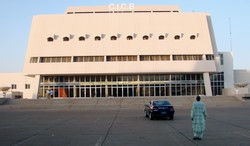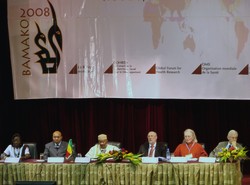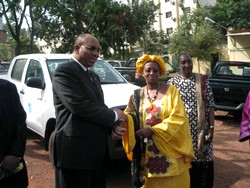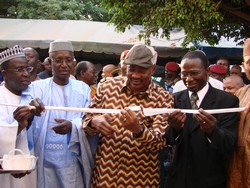Discours de Mme Aissatou Touré (version anglaise)
- Publié dans Discours
- Soyez le premier à commenter!
Aissatou Toure, COHRED – Opening Ceremony Remarks
Bamako 2008 – Global Ministerial Forum no research for Health
Your Excellency Amadou Toumani Touré, President of Mali;
Dr. Margaret Chan, Director-General, World Health Organization, Geneva;
Dr. Walter Erdelen, Assistant Director-General, Natural Sciences Sector, UNESCO;
Ms. Joy Phumaphi, Vice-President, Human Development Network at the World Bank;
Dr. Gill Samuels, Chair, Global Forum for Health Research;
Distinguished Guests
Ladies and Gentlemen
Introduction
On behalf of the Council on Health Research for Development (COHRED) I would like to express our gratitude to the Malian government for hosting this important Ministerial Forum on Research for Health. It is a pleasure and privilege to represent the COHRED Board on this platform and to deliver this speech on behalf of Marian Jacobs, our Chair.
For over 15 years COHRED has been active in the field of research for health. Our focus has been on Essential National Health Research and, today on, the research systems needed to strengthen research for health and development at the country level. COHRED was the initiator of the Bangkok 2000 International Conference on Health Research for Development, and we are privileged to co-host today’s Ministerial Forum.
It has been heartening to observe how the interest in research for health has expanded over the years, and how the scope of interest has broadened to include many more individuals and sectors. All these interested parties are committed to making a difference, especially in ensuring that research for health indeed leads to reducing inequities in health and thereby contributes to the overall development of countries.
We are meeting at an interesting time in the history of health for development, for this year we celebrate the 30th anniversary of the Declaration of Alma Ata – a milestone event which set the foundation principles for social justice in health.
In commemoration of that event, WHO has just issued its 2008 World Health Report on Primary Health Care. Three months ago the Commission on Social Determinants of Health also published its final report.
These reports are underpinned by a common philosophy and set of values on health: They stand for a holistic view of health and well-being. They argue for inclusiveness, ownership, and requirement for wide intersectoral action to achieve better health for all.
They also provide a context for health research for development, within which research is located as a core strategy that can help us achieve the goal of health for all.
Research can do this by:
• Promoting and understanding of health, its determinants and its impact on society and equity
• Developing new and better interventions to prevent and address ill-health
• Informing the development of new health policies and contributing to improvement of existing policies; and
• Providing the evidence-base for decision making at a personal, clinical, public health and policy level.
This conference will look at the major health challenges that need to be addressed through research, and at how research needs to be organised, led and managed to address these challenges. COHRED is privileged to be integrally involved in those actions – especially at country level.
Dr Chan, our congratulations to you and your team for bringing the spirit of Alma Ata – the importance of primary health care – back to the core of the global health effort. And for stressing in this year’s World Health Report the importance of improving the performance of health systems as a key strategy for achieving improved population health.
COHRED’s views on research for health
From the perspective of COHRED – the Council on Health Research for Development – there are three key strategies that are crucial for moving from health research to research for health:
• Firstly – taking a systems perspective to research for health
• Secondly – ensuring alignment between national needs and priorities and harmonisation of national and international initiatives
• Thirdly – Engaging all sectors and stakeholders – especially civil society organisations – in research for health.
I would like to discuss these points for you in greater detail.
Taking a systems view of research for health helps develop the foundations that countries need for strong research governance. A system perspective clarifies a country’s roles and responsibilities in research coordination, it develops the necessary policies and helps define the national agenda for research.
With these foundations in place :
• Governments are better placed to demand specific knowledge and evidence as a basis for their policy decisions, and to coordinate research efforts in their country.
• Researchers can respond to their country’s identified research needs, and help fill existing knowledge gaps.
• Research sponsors can direct their resources to support national agendas for research that supports development.
• Civil Society Organisations can become truly enagaged in making research for health relevant to all groups in society – in dialogue with key stakeholders.
The population must always be at the center of our work. And people will benefit from a well-governed research system, that has good policies and laws that promote ethical research that respectsthe autonomy, dignity and rights of those involved. A well-governed research system will inspire the population’s confidence in research.
This brings me to alignment and harmonisation – the second key strategy to be discussed at this meeting.
It is true that an increasing number of low and middle income countries contribute substantial national resources to funding research for health – especially in the areas of infrastructure and salary support. But much of the research project funding still comes from international sources.
The influence of these international sources is substantial, as is their potential to influence – and possibly distort – national agendas. Alignment, as advocated through the Paris Declaration on Aid Effectiveness, is one way of ensuring that research funding focuses on national priorities. Actively practicing harmonisaton reduces the significant administrative burden and complex reporting pressures that countries have in dealing with many donor agencies that support their research.
COHRED, and a number of partners, recently conducted a study on Alignment and Harmonisation in research for health. The ‘AHA’ study examined how the Paris Declaration principles can best be applied to Research for Health. Five African countries and 8 donor countries were involved in the study – and I know that some of you that were involved are here in this room.
The study found that none of the five African countries involved in the study had a fully operational health research system with clear agendas, priorities,policies, or research financing strategies. It also found that External donors represent 90% or more of the funding available for health research in the five African countries.
It is our hope that this week’s Ministerial Forum will take this discussion a step further. And will look at how to arrive at mutually beneficial funding approaches to research for health.
Ladies and Gentlemen. Inclusiveness and engagement is my third key message today. The ultimate aim of research for health is better health for all. Achieving this requires the involvement of all stakeholders, from different sectors and disciplines. A key, and often neglected, actor in the research for health picture are organisations that represent the interests of specific groups in society – civil society organisations. They are essential in realising the potential of research for health. These organisations play an important role in adding value to research for health in a number of ways, for example by:
• Driving, participating in and conducting research that embraces health in its broadest sense, including the determinants of health and health-related inequities; and
• by holding all stakeholders accountable for the commitments they make towards research for health;
It is important that we recognise that civil society organisations can improve the quality, focus and relevance of research for health. And that partnerships are build with and by CSO’s around common concerns on national and global priorities.
Ladies and Gentlemen, distinguished panel members.
Our expectations for the Ministerial Forum are high.
The participants in this meeting represent a wide range of sectors and stakeholders – including international funding agencies, civil society organisations. And for the first time, this meeting looks beyond those involved directly in health to embrace colleagues from governments’ science and technology sectors.
It is significant that many of the world’s leaders in health research for development and Ministers of Health, Science and Technology are under one roof for the next three days.
Our wish is to see real interaction between these groups.
In the past months’ preparations for this meeting we have seen much discussion and interest in the points I have evoked today.
Our hope and expectation is that all of us at this Forum set themselves the goal of going beyond discussions. We should define achievable action points for improved research for health. That Ministers, researchers, civil society organisations and funding institutions can act upon in the years to come.
I wish you all a fruitful and intereresting Bamako 2008.



 Le Forum ministériel mondial sur la recherche pour la santé, n'est pas seulement consacré aux débats scientifiques, il programme également des expositions intitulées "vitrine de la recherche". Il s'agit de stands tenus par des institutions de recherche, des partenaires techniques et financiers et des chercheurs.
Le Forum ministériel mondial sur la recherche pour la santé, n'est pas seulement consacré aux débats scientifiques, il programme également des expositions intitulées "vitrine de la recherche". Il s'agit de stands tenus par des institutions de recherche, des partenaires techniques et financiers et des chercheurs. Le Forum ministériel mondial sur la recherche pour la santé qui s’est ouvert le 17 Novembre 2008 dans notre capitale restera pour longtemps gravé dans les annales scientifiques de notre pays, voire du continent. En effet, pour la première fois, un pays de la région abrite une rencontre d’une telle dimension.
Le Forum ministériel mondial sur la recherche pour la santé qui s’est ouvert le 17 Novembre 2008 dans notre capitale restera pour longtemps gravé dans les annales scientifiques de notre pays, voire du continent. En effet, pour la première fois, un pays de la région abrite une rencontre d’une telle dimension.
 Quant aux 2 véhicules Hilux et aux 72 vélos, ils ont été offerts au ministère de la santé par le Comité des Agences Parrainantes de l’ex-OCP (1 véhicule et 72 vélos) et le projet Bill Gates (1 véhicule) ; à travers le Représentant de l’Organisation mondiale de la santé au Mali, Dr Diallo Fatoumata Binta Tidiane.
Quant aux 2 véhicules Hilux et aux 72 vélos, ils ont été offerts au ministère de la santé par le Comité des Agences Parrainantes de l’ex-OCP (1 véhicule et 72 vélos) et le projet Bill Gates (1 véhicule) ; à travers le Représentant de l’Organisation mondiale de la santé au Mali, Dr Diallo Fatoumata Binta Tidiane. Le Vendredi 31 octobre 2008 à 16 heures, sous la présidence de son Excellence Monsieur Amadou Toumani Touré le Président de la République, et le Ministre de la santé Mr Oumar Touré et d’autres personnalités, l’inauguration de L’IAFPRESS a eu lieu au siège de l'institut au quartier de fleuve en commune III, le Ministre de la santé dans son discours à saluer la création dans notre pays de l’Institut Africain de formation en pédagogie recherche et évaluation en sciences de la santé par des commités scientifiques.
Le Vendredi 31 octobre 2008 à 16 heures, sous la présidence de son Excellence Monsieur Amadou Toumani Touré le Président de la République, et le Ministre de la santé Mr Oumar Touré et d’autres personnalités, l’inauguration de L’IAFPRESS a eu lieu au siège de l'institut au quartier de fleuve en commune III, le Ministre de la santé dans son discours à saluer la création dans notre pays de l’Institut Africain de formation en pédagogie recherche et évaluation en sciences de la santé par des commités scientifiques.